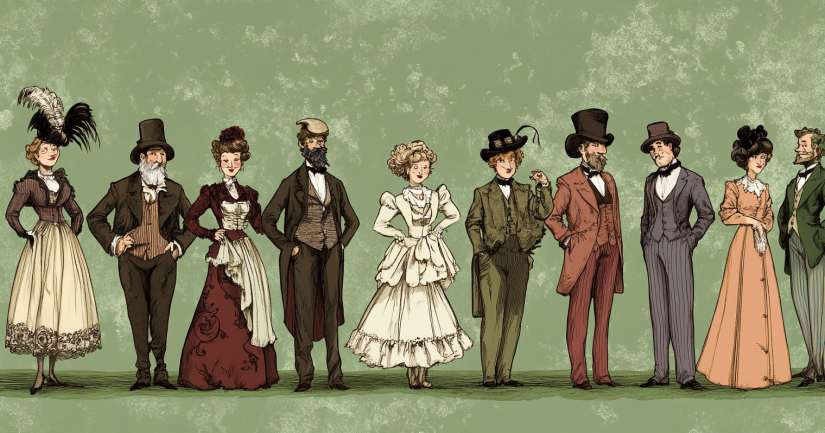
Witty repartee, mistaken identities, cucumber sandwiches, and double lives this Which The Importance Of Being Earnest Character Are You Quiz invites you to step into Oscar Wilde’s sparkling world of satire, style, and social subversion to discover which delightfully eccentric character matches your personality. Are you a polished performer of charm and cleverness like Algernon, or do you hide fierce desires beneath a prim exterior like Gwendolen? This quiz will peel back your layers, just as Wilde’s play peels back Victorian manners, and reveal the literary twin you never knew you had.
In a world where names are everything and truth is anything but straightforward, Wilde’s characters walk a fine line between absurdity and brilliance. This quiz captures the wit, hypocrisy, longing, and rebellion that make each character so timeless. You’ll answer questions on your preferences, motivations, hidden truths, and flair for the dramatic. Whether you’re drawn to tea-time theatrics or earnest confessions of love, this quiz helps you uncover your inner Wildean force and offers a little fun in the process.
Are you a witty Algernon, a romantic Cecily, or a no-nonsense Lady Bracknell? If you want to test your vocabulary, try the The Importance Of Being Earnest Vocabulary Quiz. Think you know all the facts? See if you can ace the The Importance Of Being Earnest True Or False Quiz. And if you’re ready to prove your expertise, tackle the The Importance Of Being Earnest Full Book Quiz.
Ready to Test Yourself? Start the Which The Importance Of Being Earnest Character Are You Quiz
Why This Importance Of Being Earnest Character Quiz Is So Cleverly Fun
Oscar Wilde’s play isn’t just a comedy it’s a clever critique of class, marriage, identity, and sincerity. Each character embodies a different response to societal pressure, romantic expectation, and the desire for authenticity. This quiz leans into those contrasts and contradictions. You’ll explore your opinions on decorum, romance, rebellion, and honesty, then see which character channels your spirit best.
We don’t just match you based on superficial quirks. Your result will reflect your worldview your need for excitement, your taste for drama, your instinct for rules or your delight in breaking them.
Characters You Might Match
Here are a few of Wilde’s delightfully drawn characters you may align with:
- Algernon Moncrieff – Dazzlingly witty, mischievous, indulgent, and totally unbothered by convention
- Jack Worthing – Responsible, romantic, secretive, and yearning for both order and escape
- Gwendolen Fairfax – Refined, determined, eloquent, and very sure of what she wants (especially names)
- Cecily Cardew – Imaginative, impulsive, poetic, and far deeper than she appears
- Lady Bracknell – Commanding, logical, proud, and delightfully horrifying in her judgment
- Miss Prism – Dutiful, literary, repressed, and holding more secrets than she lets on
Each result paints a vibrant portrait that captures not only what you do—but how you think and how you love.
What You’ll Learn from This Wildean Exploration
As you take the quiz, you’ll discover:
- Whether your style is romantic idealism or razor-sharp realism
- How you respond to rules whether you live by them, break them, or pretend they don’t exist
- What matters most to you: love, truth, appearances, approval, or freedom
- Which societal masks you wear, and which ones you’d rather toss aside
- How you navigate status, relationships, and the expectations of others
The quiz is playful, but your result may feel uncannily accurate Wilde had a way of seeing through to the truth, even in comedy.
Fun Facts About The Importance Of Being Earnest
- The original 1895 production was shut down due to scandal surrounding Wilde, despite being a critical success
- The name “Ernest” was chosen for its Victorian associations with morality and reliability—making the deception all the more ironic
- Gwendolen’s obsession with the name “Ernest” reflects Wilde’s critique of surface-level love and social absurdity
- Lady Bracknell’s infamous line “A handbag?” has become one of theatre’s most iconic reactions
- Wilde described the play as “a trivial comedy for serious people,” perfectly summing up its satirical core
- The character of Cecily was inspired in part by Wilde’s fascination with fantasy, memory, and writing as escapism
- Despite its humor, the play contains some of Wilde’s sharpest critiques of marriage, class mobility, and Victorian hypocrisy
Who Should Take This Quiz
This quiz is perfect for:
- Literature lovers who admire Wilde’s sharp wit and wordplay
- Students studying The Importance of Being Earnest who want a fun character lens
- Theatre fans curious about which role they’d shine in
- Romantic cynics, dreamers, and provocateurs alike
- Anyone who’s ever told a little white lie… for dramatic effect
You don’t need to know the play by heart to enjoy this experience Wilde’s characters are vivid enough to speak to anyone who’s ever played a role in society’s great performance.
Find Out Who You Are in Wilde’s World of Wordplay and Wit
Are you crafting entire romantic histories in your imagination, or interrogating social climbers over tea? Do you crave the respectable life or run from it with a fake name in your back pocket? This Which The Importance Of Being Earnest Character Are You Quiz invites you to embrace your contradictions, delight in absurdity, and finally answer the most important question of all: who are you when the curtain rises?
Take the quiz now and find the Wilde character that mirrors your heart, your habits, and your hidden double life.
The Importance of Being Earnest Quizzes – Are you as witty as Wilde?
